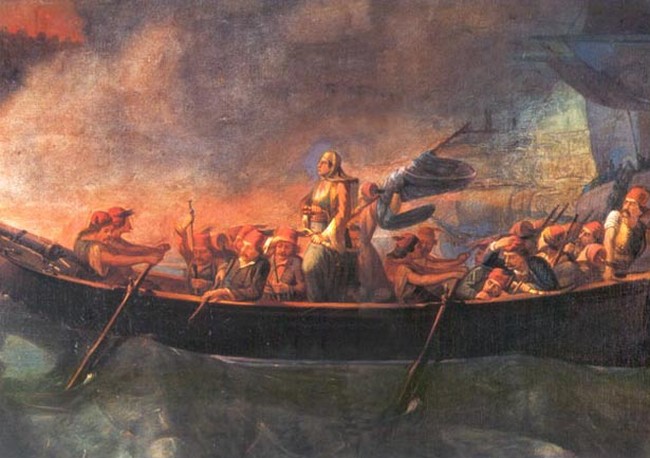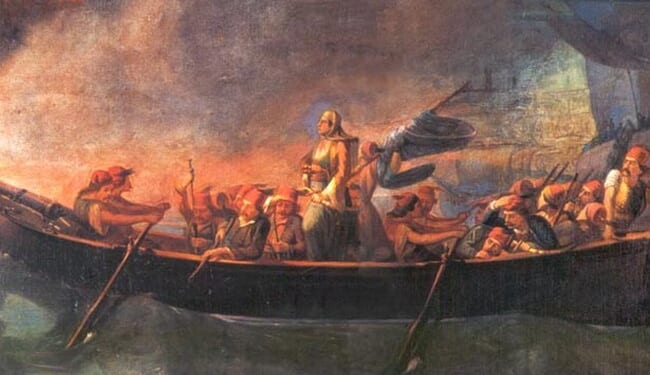
Hallelujah, so-called Women’s History Month is almost over, and we’ll soon get a break from having woke feminist pieties shoved in our faces. By now, we’ve all had our fill of encomiums to pampered mediocrities like Kamala Harris, Sonia Sotomayor, and other first this-that-or-the-other-things. As Women’s History Month draws to a close, let me introduce you to a total baller who was also a Christian nationalist and a true heroine of the West — what the left today calls a “white supremacist domestic terrorist.”
Today, March 25, is Greek Independence Day. In 1821, Greece had been ruled by the Ottoman Empire for longer than the United States has existed — nearly 400 years. I will leave detailed accounts of Islamic barbarities against Christians to my PJ Media colleagues Raymond Ibrahim and Robert Spencer, so suffice it to say that the Ottoman Turks were medieval monsters of the first order in their oppression of the Greeks. But for all that time, the proud Greeks never forgot who they were.
History holds that on March 25, 1821, Bishop Germanos of Patras raised the Hellenic flag over the Monastery of Agia, sparking the Greek revolt from Turkish rule. The cry “Freedom or death” became the motto of the Greek revolutionaries. But a week earlier, a woman named Laskarina Bouboulis (née Pinotsi) had already hoisted the Greek flag in defiance of the Turks — on her very own ship of war.
Bouboulina, as she is still known, was no friend of the Ottomans. She was born in a Turkish prison in Constantinople (which the Turks renamed Istanbul), where her mother had traveled to visit her interned father. (He later died there.) She married at 17 and had three children. But nine years later, her husband was killed by Barbary pirates. She remarried to a wealthy shipowner and captain, had four more children — and lost her second husband to the Ottoman Corsair pirates, too.
“At the age of forty, Laskarina was a widow for the second time. She never remarried, and so kept the surname of Bouboulina for the rest of her life. Her husbands gave her seven children and a fortune that she turned into the foundation of a merchant empire. She was the partner in several trading vessels and soon began having her own built to sail the waters,” writes Irish historian Ciaran Conliffe. Remember this woman’s astounding accomplishments the next time some angry, unshaven feminist barks at you that women were nothing before they saved us with their virulent political activism.
But Bouboulina didn’t stop there. As she built up her empire, the Ottomans came at her like a Soros DA, trying to confiscate everything. They used the excuse that her second husband had fought with the Russians against the Ottomans years earlier. So Laskarina sailed to Istanbul to ask for help from the Russian ambassador. She was granted refuge in Crimea (which was Russian at that time) and eventually influenced Ottoman Sultan Mahmud II to grant her amnesty.
Meanwhile, Laskarina used her endless merchant fleet construction as cover for building warships:
The mightiest of these was named Agamemnon, and Bouboulina had to bribe the local officials to get it built. There were normally limits on the size permitted for civilian vessels, but she was able to convince them that she had built it so large in order to get a trading advantage. She was also active in recruiting fighters from Spetses and in smuggling in supplies and weapons for the revolution. This included 18 cannons ready to be fitted on the Agamemnon. By the end of 1820, she had everything in place and was waiting for the war to begin.
As the Ottomans were busy fighting with the Persians at this time, the Greeks took the opportunity to launch their bid for freedom.
In March of 1821 Laskarina Bouboulina openly joined the rebellion, raising a Greek flag of the Revolution on the mast of the Agamemnon. It was a unique flag of her own design, based on one of the flags of the Byzantine Empire. (At that time, the natives of Greece still referred to themselves as “Romans” in memory of the Eastern Roman Empire they had once ruled.) She became the leader of the first naval force to declare for an independent Greece, a significant achievement for such a maritime nation. She led them to the town of Nafplio, one of the major Ottoman strongholds in Greece, where they blockaded the harbour and began what would be a protracted siege. The town had three forts and was defended by three hundred cannons; the Ottomans considered it impregnable. In the end it held out for a year and a half. Bouboulina personally led several of the attacks during that period, leading her to be described by the historian Anargyros Hatzi-Anargyrou (who also took part in the siege) as “indeed lion-hearted”.
The war raged and eventually began to turn in the Greeks’ favor. Bouboulina wasn’t done being a swashbuckling badass, though:
In October of 1821 the city of Tripoli fell to the Greek armies, giving them effective control of the Greek mainland. Bouboulina came to the city on a break from her blockade just in time to witness the walls coming down. This resulted in the Greek troops [proving] that they were just as capable of committing massacres as the Ottomans given the chance. However in memory of her friendship with Nakshidil [the mother of Sultan Mahmud II], Bouboulina made straight for the harem of the local pasha and was able to protect the women there from the rampaging soldiers.
When the new Greek republic finally came into being, Laskarina Bouboulina was a national hero. After her death, the Russian Tsar posthumously granted her rank of Admiral of the Russian Navy, making her the first woman in history to hold that title. (Sorry, “Rachel” Levine, you’re just not all that.)
Exclusively for our VIPs: ‘Rachel Levine Is a 4-Star Admiral’ Is Our ‘Caligula’s Horse Is a Senator’ Moment
Obviously, a story like Bouboulina’s is not very fashionable in our enlightened new glolablist U.S., where Turkey and Islam are held in higher regard than Christianity and American patriotism, and that’s too bad. But please, spoiled woke American ladies, spare me your tales of how Western women were always oppressed and had no significant achievements until you came along to save us.

